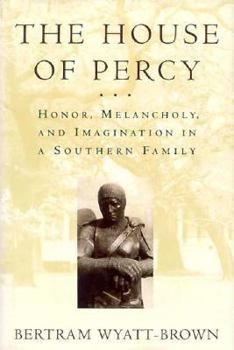The House of Percy: Honor, Melancholy, and Imagination in a Southern Family
Select Format
Select Condition 
Book Overview
The novels of Walker Percy--The Moviegoer, Lancelot, The Second Coming, and The Thanatos Syndrome to name a few--have left a permanent mark on twentieth-century Southern fiction; yet the history of the Percy family in America matches anything, perhaps, that he could have created. Two centuries of wealth, literary accomplishment, political leadership, depression, and sometimes suicide established a fascinating legacy that lies behind Walker Percy's...
Format:Hardcover
Language:English
ISBN:0195056264
ISBN13:9780195056266
Release Date:October 1994
Publisher:Oxford University Press, USA
Length:504 Pages
Weight:1.90 lbs.
Dimensions:1.5" x 6.5" x 9.5"
Customer Reviews
2 ratings
Marcus Aurelius in the Mississippi Delta
Published by Thriftbooks.com User , 14 years ago
The book is a tour de force of the literary and political efforts of the Percy family. It is certainly of more interest to those who combine psychology with literary criticism. The Freudian analysis is a bit heavy. The author clearly knows the topic. When you are not in England, New England, or Italy you return to the South--my primary interest. It did give me an insight into the planter aristocracy of the Delta and the conflict it had with the less affluent Baptistic white and black population. At their best, the Percys represented a type of stoicism reminiscent of the Roman emperor Marcus Aurelius--honor, duty, and noblesse oblige. At their worst, the aloofness and paternalism of a social class that claimed a superiority in the name of Social Darwinism. When Will Percy dismisses his trusted black valet after the man saw him naked in the shower and proclaimed, "Why, you are just a fat white man!"--it sort of says it all. It is true that Walker did his best to overcome even such "enlightened prejudice" that made the Percys foes of violence and the lynch mob, but in the end even Walker did not entirely escape his heritage. His conversion to Roman Catholicism was less a repudiation of Southern ethnocentricity and more a yearning for tradition and order in the modern world. Yet, the Percys no doubt made a positive contribution to their Mississippi Delta home. They did not have the "tortured howl" of the Blues so aptly put by Gerard Helferich in his book, High Cotton, but they certainly possessed the brooding and foreboding of a decaying and gothic Southern gentility. On the cover is the statue of the exhausted crusader knight with a worldly tired face still standing in the Greenville cemetery. An impressive work of the sculptor, but as the author points out--"hollow inside"--a tortured soul yearning to be filled with God's Peace.
Almost Perfect
Published by Thriftbooks.com User , 19 years ago
Bertram Wyatt-Brown presents a compelling case that genetics predisposed at least six generations of my family to clinical depression. Bert also argues persuasively that nurture, the flip side of genes, produced its own persistent haunts in the family line--the Percy obsession with "honor," which he sees as aristocratic rectitude combined with a ruthless sense of entitlement to wealth and power. Exhaustively researched, methodically laid out, House is a solid work of history and a provocative and convincing text that often reads like a Southern-Gothic tale. It contains, however, a number of small errors, and one big blind spot: the question of homosexuality, its prevalence in the Percy family, and its relationship both to depression and to heredity. Bert falls victim to a common error, "the presumption of heterosexuality." Of Charles Percy's descendants through his son Thomas George, only four can be identified with certainty as lifelong Kinsey "6's" or near-"6's," that is, as exclusively or almost exclusively homosexual: my first cousin once removed, the writer William Alexander Percy, my aunt, Lady Caroline Percy, my great-great uncle, Leroy Pope Percy, and me. But the family history is rife with suggestions that plenty of us were at least bisexual (Kinsey 2's-5's), and that these Percys, like so many other queers labeled as sinners, outlaws, and mentally ill, also grappled with depression, in some cases to the point of suicide. I can only speculate as to why Bert is not more open to this evidence, but nevertheless, he was written an excellent book.






